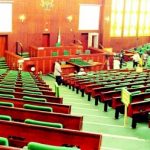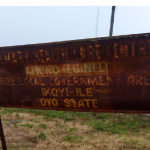ARI seeks to encourage debate and question orthodox views. Following a meeting with Dimeji Bankole in late 2016, we post this second guest blog by the former Speaker of Nigeria’s House of Representatives which draws on what was discussed. The first piece on reforming Nigeria from within is available here.
Nigeria is in the midst of a demographic shift. Current estimates suggest that 60% of the population is under the age of 25, but over the next 30 years the balance between young and old is going to converge towards a fifty-fifty split. How are we going to afford to look after our pensioners or pay civil service basic salaries, when we cannot do so now?
Source
Nigeria’s current predicament is the manifestation of decisions taken 30 – 40 years ago. It follows that those taken today will manifest themselves in the next three or four decades. If we do not intervene now, the college graduate who is hawking water sachets on the street aged 30 is going to be doing the same thing at 60. This will lead to a total breakdown of the extended family structure in Nigeria, an increase in inequality and extreme poverty, the consequences of which are frightening to think about.
The fallacy of free education in Nigeria
Chief Obafemi Awolowo championed the policy of free education for Western Nigeria in the 1950s and 1960s. In 1979, he ran for the presidency and lost. However, his ideas about education were taken on board by the elected government in the region. The original policy was outstanding in scope and noble in its intentions but crassly implemented and executed. Education became a politically expedient issue, and education for the masses, notwithstanding the quality of that education, was to be pushed through. The requirement that students had to pass exams to qualify for free education was ignored and boys and girls aged ten or above were automatically entitled to secondary school. They would be enrolled despite the fact that maybe only one in five could read English. It is on record that students were coming top of their class with less than 40% in exams. Unity schools fought back against the pressure to lower education standards, but they only made up less than 1% of the total.
The knock-on effect was that people sought to take advantage of free education and in doing so left behind craftsmanship, agriculture and other important facets of the local economy. The repercussions were not apparent right away and return to military rule in 1983 prevented analysis of the long-term social effects of this policy. Instead the military government went ahead and built state universities, which were to be populated by students from this defunct education system. Standards were lowered to ensure more students were accepted. Some were finishing secondary school and applying for university even though they could barely write. It also became commonplace to have someone else sit your exams for you. If a young man at 18 believes that he can get away with doing or obtaining something by such means, he will continue to do so as an adult.
Individuals who went through Nigeria’s education system in the 1980s are now in their 40s and 50s. This generation are the ones running almost all the government agencies, banks, civil service and businesses. The mindset of entitlement still permeates how they act. This pattern of behaviour is now evident in the next generation who do not see the value of hard work and take things for granted. We need to shift this way of thinking, if we are to solve the problems that lie in wait for Nigeria.
A new sort of federal character
Tackling the immediate economic and political challenges is important, but we also need to go back and start rebuilding some of these education structures if we are to create citizens with the right kind of character and work ethic. In Japan, teachers are some of the highest paid and respected public sector workers. This used to be the case in Nigeria. Today, many of our teachers are those who did not get the grades required to attend university. We have individuals who failed to get into university, with their low entrance qualifications, going to teacher training colleges and teaching our future generations. I have met primary school teachers who cannot read. At the moment we have the least-qualified training and mentoring our future generations. What impact will that have on the children they are teaching?
Nigeria needs to create centres of educational excellence. Are incentives part of the solution to get highly skilled people into our education system? Do we need 200 universities or 180 universities and 20 specialised universities that can produce experts for different sectors? For example, a state university could specialise in a particular area – like agriculture, mining, technology or tourism – based on the economic growth priorities of that state. The research from these universities could then be used by the state government, and even further afield, to inform and shape policy. Politicians are not supposed to be experts themselves, but should have the nous to draw on the knowledge of others in order to tackle critical issues and promote development. This is how Nigeria started, but we have lost our way.
Future leaders with integrity
Nigerians who have worked at places like the World Bank for decades are being encouraged to come back to the country to head ministries and agencies. This should be regarded as an upward career move. Currently, the reverse is true. Many treat it as a stepping stone to another prominent position in an international institution. Returnees like that bring experience and new ideas, certainly, but their effectiveness and long-term impact has been limited by a lack of ownership. They do not have sufficient “skin in the game”; they see their own future outside the country and are not sufficiently committed to Nigeria’s long-term development and success. I do not begrudge such people their career decisions, but the country needs and deserves more. We need more committed leaders in strategic positions of governance if we are to start tacking tomorrow’s problems today.
Dimeji Bankole is the former Speaker of the House of Representatives in Nigeria. He tweets @DimejiSBankole












